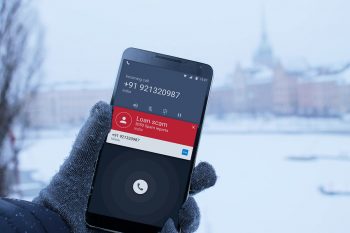
Here’s how spam blocking apps like Truecaller actually work
You’re just leaving the gym when you get a call from a number you don’t recognize. You swipe right and bring the phone to your ear, but before you can even say hello you’re blasted with a cruise ship horn and an enthusiastic computer voice promising you a free cruise. It’s annoying when it happens once, but when you get these calls every day, it starts to become problematic.
That’s when you start looking for an app to block spam calls on the Google Play Store. On the surface, these apps work as promised. They’ll identify numbers you don’t know and they’ll automatically block numbers that are believed to be spammers before they can bother you. But as always if the app is free, then you’re the product.
How Spam Blocking Apps Work
Spam call blocking apps like Truecaller and Hiya work by comparing the numbers that call you against their huge database of billions of numbers. This database of millions of numbers is collected from everyone who installs the app as part of the End User License Agreement (EULA) that you agree to when installing the app.
Once your contacts data such as their names, phone numbers, and email addresses are on Truecaller’s servers, any Truecaller user now has that data available to them to identify spam calls and texts when they come in. But that’s not all the information they collect, either. If you happen to sign-in using Facebook, Yahoo, Google, or Microsoft, that information will be collected also.
Here’s the relevant peek at Truecaller’s privacy policy:
You acknowledge and agree that any Contact Information that You share with Truecaller is submitted for publication in the Truecaller database, for which a Publishing Certificate has been issued. Such Publishing Certificate provides for constitutional protection under the Swedish Fundamental Law on Freedom of Expression, see the Terms of Service.
So not only is your information uploaded to their database, but also all of your contacts’ information too. That also means you don’t even have to install the app to end up in their database if one of your friends also uses the app.
What do they do with my data?
While it may seem uncomfortable to have your data in a massive database that can be used at a company’s whims, the real nefarious thing about the whole way Truecaller makes money is that they share your data with third parties. So that means the very spam calls you’re trying to prevent? Truecaller is passing your number out to companies that use that information to spam you.
Once again, let’s take a peek at the privacy policy:
Truecaller may also share personal information with third party advertisers, agencies and networks. Such third parties may use this information for analytical and marketing purposes e.g. to provide measurement services and targeted ads and for improvement of products and services.
So the service they’re providing can actually pass your number along to more spammers than already had your number. That’s a little disingenuous when you think about it, especially if your goal is to end spam calls when you install the app.
[UPDATE: Truecaller says they follow Google Play’s guidelines, which means they do not upload contacts and make them publicly searchable when downloading the app. They insist their data is public white/yellow pages, social media, Truecaller users, and Truecaller users tagging numbers that they cannot identify. Additionally, they claim to use Google and Facebook ad products to show more relevant ads to users. Truecaller says that no information or database is shared with advertisers.]
How do I unlist my number?
So you’ve decided that appearing in a database with personal information like your phone number and email address probably isn’t the best thing for your privacy. Here’s how you get yourself out of Truecaller’s database.
1. Go to Truecaller’s website.
2. Click here to unlist your number.